What we know
- Israeli Prime Minister Benjamin Netanyahu said late yesterday that he is open to negotiations, even as the IDF advanced its military operations into Sunday.
- The killing by the IDF of three Israeli hostages in Gaza is leading to increasing pressure for another round of negotiations between Israel and Hamas to release the remaining hostages over continuing the full-scale offensive in Gaza. The killings have fueled rising Israeli anger at the government and Netanyahu over the war in Gaza.
- The IDF said it found a sign written on what appeared to be a white sheet with leftover food that said, "Help! 3 hostages." The sign was found in a building near where three hostages were killed after being mistaken for combatants.
- In a statement, Hamas said that it would not conduct negotiations until Israel stopped its assault on Palestinians "once and for all." It has conveyed this position to Qatar, which mediated the hostage-for-prisoner swap and cease-fire late last month.
- Telecommunications services in parts of Gaza are slowly being restored amid a communications blackout that isolated the enclave from the outside world and hampered aid and rescue efforts.
- Defense Secretary Lloyd Austin embarked on a tour of the Middle East this weekend, with stops scheduled in Israel, Qatar and Bahrain. He plans to discuss the “eventual cessation of high-intensity ground operations and airstrikes” with Israel, reiterating a U.S. push to the end ground hostilities.
- More than 18,700 Palestinians have been killed, with 70% of them women and children, according to the territory's health officials. The vast majority of Gaza’s 2.2 million people are displaced, and an estimated half face starvation amid an unfolding humanitarian crisis.
- Israeli military officials say 116 soldiers have been killed during the country's ground invasion in Gaza, which came after 1,200 people were killed and about 240 hostages were seized by Hamas on Oct. 7.
- NBC News’ Richard Engel, Raf Sanchez, Hala Gorani, Hallie Jackson, Ali Arouzi and Chantal Da Silva are reporting from the region.
This live blog is now closed. For the latest updates please click here.
Bomb threat made to New Jersey school, law enforcement official says
Educational facilities operated by New Jersey’s Barnert Temple were the subject of a threat today, a law enforcement official said.
"I can confirm that there was a hoax bomb threat there, but I don’t have any additional information to provide," Elizabeth Rebein, spokesperson for the Bergen County Prosecutor's Office, said by email.
It was one of several Jewish institutions targeted by email threats this weekend, authorities said. So far, none of threats, which mostly involved claims of bomb placement, have been considered credible.
Leaders of the Franklin Lakes temple, established in 1847 and now dedicated to Reform Judaism, say its congregation is the oldest in the state. It has a preschool, hosts classes for students in grades K-12, and produces online courses for adults.
Israeli hostage says she found the strength to survive in her 2 daughters
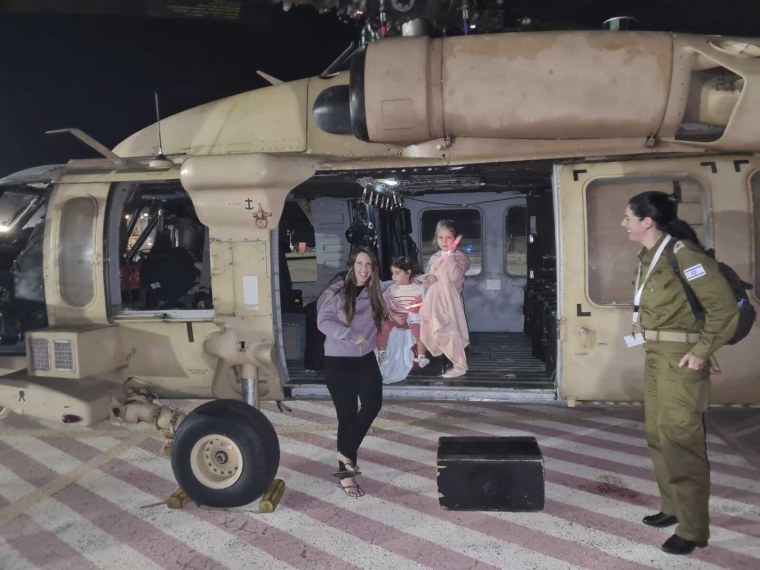
TEL AVIV — Tantrums, tears, temperature, toilet accidents. These travails of childhood are familiar to any parent. But for Doron Katz Asher, the daily whims of children took on a new, frightening dimension while in Hamas captivity with her two young daughters.
If the girls cried, militants would bang on the door of the room where she was being held. When they were hungry, she didn’t always have anything to feed them. She slept with one eye open, always keeping watch over her daughters.
“(I felt) Fear. Fear that maybe because my daughters are crying and are making some noise they’ll get some directive from above to take them, to do something to them,” Katz Asher told Israel Channel 12 TV in a lengthy interview broadcast Saturday night. “Constant fear.”
Her account builds on a growing number of freed captives who are sharing their harrowing stories of weeks in captivity even as roughly 129 hostages remain.
Katz Asher, 34, and her daughters Raz, 4, and Aviv, 2, were visiting family in Kibbutz Nir Oz when Hamas attacked the sleepy farming community on Oct. 7. Katz Asher, her daughters and her mother were put on a tractor and driven to Gaza. An exchange of fire erupted between the militants who snatched them and Israeli forces, killing her mother and leaving her and Aviv lightly wounded, she said in the interview.
After they made it to Gaza, Katz Asher said she and her daughters were taken to a family’s apartment, where her wounds were stitched up without anesthetics on a couch as her girls looked on. She did not say if Aviv was treated.
The father of the house spoke Hebrew, which he said he had learned years earlier working in Israel. A Palestinian mother and two daughters served as their guards for the 16 days they were held in the home. They were told to keep quiet, but were given coloring pencils and paper and passed the time drawing. Katz Asher said she started teaching her 4-year-old how to write in Hebrew. The first word she taught was “aba,” or “dad.”
As the sounds of the Israeli military’s fierce bombing campaign rang out around them, her captors fed her false hope, telling her a deal was imminent for their release. She and her daughters would eventually be freed in a temporary cease-fire deal in late November.
With food running low at the family home, one night she was dressed in Muslim attire that concealed her identity and she and her daughters were forced to walk for 15 minutes to a hospital that was not named in the interview, where they were sealed in a room with other Israeli captives who she recognized. Ten people were locked together in a 130-square-foot room with a sink but no mattresses. The window was sealed shut, food was inconsistent and using a toilet hinged on the permission of the captors.
“They could open after five minutes or after an hour and a half,” she said, echoing similar testimony from other freed captives. But, she added, “small girls can’t hold it.”
Katz Asher said one of her daughters had a fever of 104 degrees Fahrenheit for three days straight. To bring it down, she ran cold water over her forehead.
They made a deck of cards and drew the foods they badly missed to pass the time. Katz Asher saved her own small portions of food — pita with spreadable cheese and spiced rice with meat — so that her daughters wouldn’t go hungry.
Her daughters had an incessant list of questions about their ordeal, the innocence of a child’s curiosity colliding with an inexplicable calamity. “When will we return to dad at home? And when will they return to day care? And why is the door locked? Why can’t we just go home? And how will we even know the way home?”
All the while, with dread engulfing her, Katz Asher said she projected calm to her daughters, promising them, and perhaps herself, they would go home soon.
“What helped me survive there was that my daughters were with me,” she said. “I had something to fight for.”
IDF denies attacking civilians, says it found Hamas operations in Kamal Adwan hospital
TEL AVIV — Following reports of a raid at Kamal Adwan hospital, the IDF released a statement confirming that it was operating in the complex but denied allegations that it was attacking civilians.
"Before the IDF entered the compound, a dialogue with medical teams was carried out," the statement said. "IDF forces allowed a humanitarian transition to evacuate the civilians and injured."
The statement added that a component of the hospital’s area was destroyed as part of efforts to uncover a shaft but there were no children involved and no civilians buried. The IDF noted that there were dead bodies that had been buried in the area before their arrival, but did not address accusations that bulldozers damaged the cadavers.
According to the IDF, soldiers found weapons, classified documents and tactical means of communication hidden inside incubators meant for babies belonging to Hamas. NBC News has not independently verified the IDF's claims about Hamas operations.
Threats emailed to synagogues, Jewish organizations in 8 states and Washington
Hoax threats were sent to more than a dozen synagogues and other Jewish institutions in at least eight states and Washington, D.C., this weekend, officials said.
In each instance, the threats — most of which have been about bombs — appear to have been emailed, according to statements from synagogues, Jewish organizations and law enforcement.
Synagogues and Jewish organizations in Maine, Michigan, Georgia, Alabama, Tennessee, Mississippi, Colorado, Massachusetts and Washington, D.C., received the threats. It wasn’t immediately clear if they were all related.
In some areas, more than one location was targeted. Police in Boulder, Colorado, said an emailed bomb threat sent to Congregation Har HaShem was also sent to multiple other synagogues in the area. The Roswell Police Department said two synagogues in the Georgia city north of Atlanta, and others in the metro area received “identical threats.” The Jewish Federation of Central Alabama said six of the seven Jewish entities in central Alabama were threatened.
The Metropolitan Police Department said multiple Washington synagogues got threats, noting, “there are no known credible threats, nor any intelligence indicating intent by any groups to attack or disrupt any religious or social institutions in the District of Columbia.”
In Tennessee, the Jewish Federation of Greater Nashville said emailed threats were sent to it and “numerous other Jewish communal organizations.”
“These threats are part of a national trend to harass and intimidate American Jews,” the federation said in a statement. “We will not be afraid, and will continue to live proud and joyful Jewish lives in our amazing Nashville community.”
The FBI said it was aware of the numerous threats.
“While we have no information to indicate a specific and credible threat, we will continue to work with our local, state, and federal law enforcement partners to gather, share, and act upon threat information as it comes to our attention,” the FBI said in a statement. “We urge the public to remain vigilant, and report any and all suspicious activity and/or individuals to law enforcement immediately.”
Defense Secretary Austin arrives in Bahrain for Middle East visit
WHO 'extremely concerned' over reports of Kamal Adwan Hospital raid
World Health Organization Director-General Tedros Adhanom Ghebreyesus said the organization is “extremely concerned” following reports of a raid at the Kamal Adwan Hospital in Gaza.
The raid left the hospital nonfunctional and resulted in the death of at least eight patients, according to the WHO. The organization is also seeking information on staff members who were detained.
“We learned that many patients had to self-evacuate at great risk to their health and safety, with ambulances unable to reach the facility,” Tedros said in a post on X. “Of the deceased patients, several died due to lack of adequate health care, including a 9-year-old child.”
Al Jazeera employee uses Emmy speech to honor colleagues in Gaza
AJ+ show host Yara Elmjouie used his speech after winning an Emmy Award yesterday to honor his Al Jazeera colleagues, while executive producer Shadi Rahimi held a sign that read, "killing journalists is a war crime."
"I cannot in good conscience stand here before you today and not talk about the tragedy unfolding in Gaza and my Al Jazeera colleagues who are covering it," he said. "Yesterday, our cameraman Samer was killed in an Israeli airstrike. Another colleague, Wael, was wounded after losing his wife and children in another Israeli airstrike earlier. ... And don't stop sharing the stories of those who do not have access in the corridors of power."
Samer AbuDaqa and Wael al-Dahdouh were reporting in Khan Younis when an Israeli drone launched a missile in the area they were in, according to Al Jazeera. The outlet accused Israel of deliberately targeting journalists in the war zone and said in a statement that it was asking its lawyers to "urgently refer" AbuDaqa's death to the International Criminal Court.
The Committee to Protect Journalists has confirmed 64 journalists have been killed since the start of the war, 57 of whom were Palestinian.
We can’t find solutions if we can’t agree on basic historical facts
A 2020 survey found U.S. millennials and Gen Zers don’t know basic facts about the Holocaust. Ali Velshi walks through the astonishing statistics surrounding the lack of understanding of the Holocaust and its consequences.
IDF alleges it found a large Hamas tunnel underneath Erez border crossing
The IDF said in an X post today that it has discovered a "massive tunnel system" underneath the Erez border crossing, which was utilized by Gazans to enter Israel for work prior to Hamas' Oct. 7 attack.
The system spans more than two miles and an entrance was found roughly 1,300 feet from the crossing, according to the IDF. The IDF alleged that the tunnels were a project overseen by the brother of Hamas leader Yahya Sinwar and released a video of him allegedly in a car passenger seat being driven through the tunnels.
A different video that the IDF purports to be Hamas footage recovered by Israeli intelligence shows men walking around what appears to be a large underground shaft with a track laid down. In one clip, men hold a tool to a dirt wall.
NBC News has not independently verified the video or the claims made by the Israeli military.
IDF accused of running over dead bodies with bulldozer outside of Gaza hospital
The Israeli military is accused of crushing cadavers with a bulldozer outside of the Kamal Adwan Hospital during a raid in Gaza, according to both the Ministry of Health and a journalist.
Al Jazeera's Anas Al-Sharif posted a video to social media walking around the hospital complex following an IDF raid, describing a terrible stench and body parts strewn in the debris. He said that witnesses said displaced people and injured patients were among the dead.
"This is the body of one of the injured (patients) who were inside the hospital. … The bulldozers drove over them and left," Al-Sharif said, according to an NBC News translation.
Gaza's Ministry of Health alleged that the IDF dug a hole and dumped the bodies in it using a bulldozer. The ministry demanded an international investigation into the scene at the hospital.
The IDF has not yet responded to a request for comment on the allegations. NBC News is not able to verify the claims but was able to verify Al-Sharif's location in the video he posted online, and Reuters had similar footage of the scene outside Kamal Adwan.
A witness interviewed by Reuters, who was not named, told the outlet on camera that "people were buried here under the rubble." A man, also unnamed, told Reuters that his 25-year-old son was a patient and he had left to get him his medicine.
He showed the camera a box of what he said was medication, and added that he believed his son was underneath the rubble.
Catholic church in Gaza City under sniper fire trapping civilians, U.K. MP says
Civilians who were sheltering at the Holy Family Church complex in Gaza City have been trapped without food or water as they are subjected to sniper fire, Layla Moran, a member of the U.K. Parliament, told the BBC in an interview today.
"There's a woman and a daughter who have been killed, and what's been happening is as they try and leave their room, say to go to the toilet or something, there is firing at them," Moran said.
Moran says that she has family members inside the compound who have relayed details to her, alleging that the last working generator caught fire after they believe it was struck by gunfire. She told the BBC that she isn't sure what is going on but asserted that her family members "are not justifiable collateral damage."
In a post on X, Moran also noted that a tank has been stationed outside of the church and snipers are at every window of the church. She noted that there is still no access to food or water as the people inside remain trapped.
Israel Defense Forces spokesperson Lt. Jonathan Conricus told NBC News that the IDF was “looking into” reports of the killing and checking with troops on the ground. He added that "categorically" the military would not strike anything that is not an "enemy combatant."
IDF finds sign that said 'Help! 3 hostages' in investigation into killings
TEL AVIV — As the IDF continues its investigation into three hostages who were killed by soldiers, the military said it has found a sign written on what appeared to be a white sheet with leftover food asking for help.
The sign was found in a building nearby to where the three men were killed after being mistaken for combatants, Israel's military said. IDF Chief of Staff Lt. Gen. Herzi Halevi told soldiers that he hopes the IDF may come across more hostages in the future "and we will do the right thing."
"I tell you in a very simple way, the incident is very difficult and painful, and no one will come and say otherwise,” Halevi said. "I’m telling you that this is an incident that very easily could have not happened."
He added that it was no less important if it were Gazans who came up with their hands raised. Halevi instructed that even if it was someone who had previously fought the IDF, soldiers do not shoot: "We capture them, we don’t shoot them."
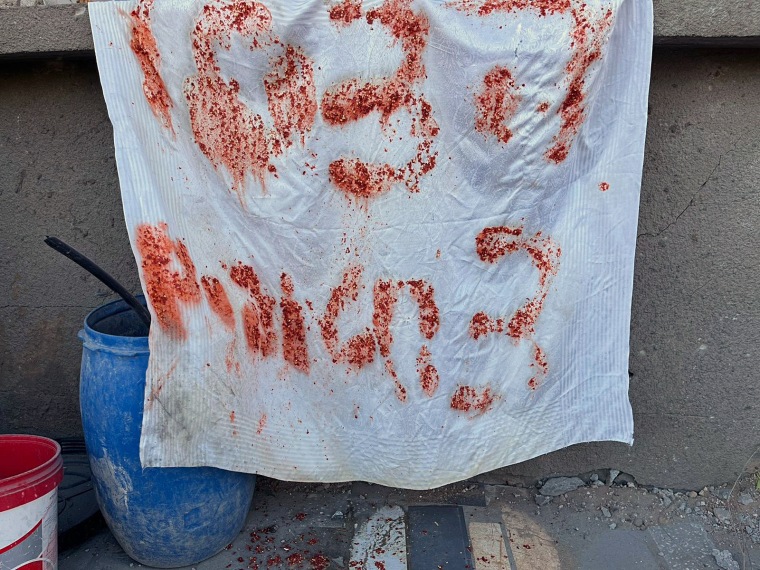
Funeral held for Alon Lulu Shamriz, one of three hostages killed by Israeli forces in Gaza
The body of 26-year-old Alon Lulu Shamriz was laid to rest as his mother recognized his strength during his time in captivity. Shamriz was one of three Israeli hostages mistakenly killed by the Israeli military in Gaza.
Doctor says IDF raided Gaza hospital, investigated staff and patients
Outside of Kamal Adwan Hospital in Gaza, a man cries as he helps a group of people wrap a dead man in a white shroud. A young girl lays quiet on a cart with blood across her forehead and chin, pulling on the sleeves of her pink sweater as adults talk around her.
According to Dr. Ahmed Al-Khalot, IDF soldiers entered the hospital compound through the gates and ordered displaced Gazans sheltering inside from ages 16 to 65 to leave. The next morning a raid began as soldiers began a search inside the hospital, taking employees and injured patients "for investigation," he said.
"There were six bodies, and a 60-year-old patient who died. ... I don’t know what they did with them," Al-Khalot told Reuters.
NBC News has reached out to the IDF regarding the raid at Kamal Adwan Hospital and accusations levied by Gaza's Ministry of Health.
Hostage killings underscore IDF's shoot-first practice, HRW director says
News that IDF soldiers killed three hostages after mistaking them for threats has opened Israel's military to a new wave of criticism, particularly after it was revealed that the hostages waved a white flag before they were killed.
Human Rights Watch's Israel and Palestine Director Omar Shakir wrote in an X post that the news underscores a policy by Israeli forces to shoot first.
"Hostages should not have been in Gaza—hostage-taking is a war crime," Shakir wrote. "But the killings underscore Israel forces’ long-standing practice of shooting first/asking later & track record of unlawfully firing at unarmed people who pose no threat w/ impunity—even those waving white flags."
He also linked to a 2009 Human Rights Watch report regarding white flag killings during military operations in Gaza, which was called Operation Cast Lead. The report states that in multiple killings of Palestinians, evidence found that unarmed civilians tried to convey their noncombatant status by waving a white flag.
"In each of these incidents, the evidence strongly indicates that, at the least, Israeli soldiers failed to take feasible precautions to distinguish between civilians and combatants before carrying out the attack," the report said. According the report, two Israeli commanders alleged that Palestinian fighters used white flags to shield themselves but failed to provide details.
Rep. Debbie Dingell: 'We have to show some empathy'
Rep. Debbie Dingell, D-Mich., said that if Biden is to win over Michigan voters, a state that has a large Muslim population, there needs to be an end to the suffering in Palestine.
"There is a lot that has to be done and this is a very serious issue," Dingell said on "Meet the Press" today. "I know this community, they are hurting. All of us in this country need to understand what is happening in Gaza right now."
Dingell detailed the horrific conditions for people in Gaza.
"We have to show some empathy and compassion. A Jewish baby and a Palestinian baby are babies, I don't want to see any baby die," Dingell said. "We've got to get a cease-fire. This has to stop."
Suez Canal traffic continues as some companies avoid shipping passage
Traffic at the Suez Canal, one of the most used shipping passageways in the world, continues to function as normal, said Lt. Gen. Osama Rabie, chairman of the Suez Canal Authority.
"Navigation traffic in the canal is regular and we are closely following the repercussions of the impact of the ongoing tensions in the Red Sea on navigation traffic in the canal," Rabie said in a statement today.
His statement follows attacks on shipping vessels in the Red Sea by Yemen's Houthi rebels, who have vowed to continue targeting maritime trade until Israel stops its assault on Gaza. Some shipping companies have said they would avoid the Suez Canal as a result, according to Reuters.
The canal is an artificial waterway in Egypt connecting the Mediterranean Sea and the Red Sea. It serves as the fastest route between Europe, the Indian Ocean, and the Pacific Ocean.
Hostages' relatives spend 'cold' night camped outside Israel's Defense Ministry
TEL AVIV — It was a “very cold” night for some of the families with loved ones held hostage by Hamas after they camped outside Israel’s Defense Ministry in a bid to pressure the Israeli government and military to release a clear plan to see their relatives released.
"This is a feeling of urgency that I never felt in my life," Raz Matalon, 53, told NBC News. Matalon's two brothers-in-law, Eli Sharabi, 51, and Yossi Sharabi, 53, are believed to be among the hostages still held by Hamas after they were kidnapped on Oct. 7. Eli Sharabi's wife, Lianne, and their two children, Yahel, 13, and Noiya, 16, were killed that day, he said.
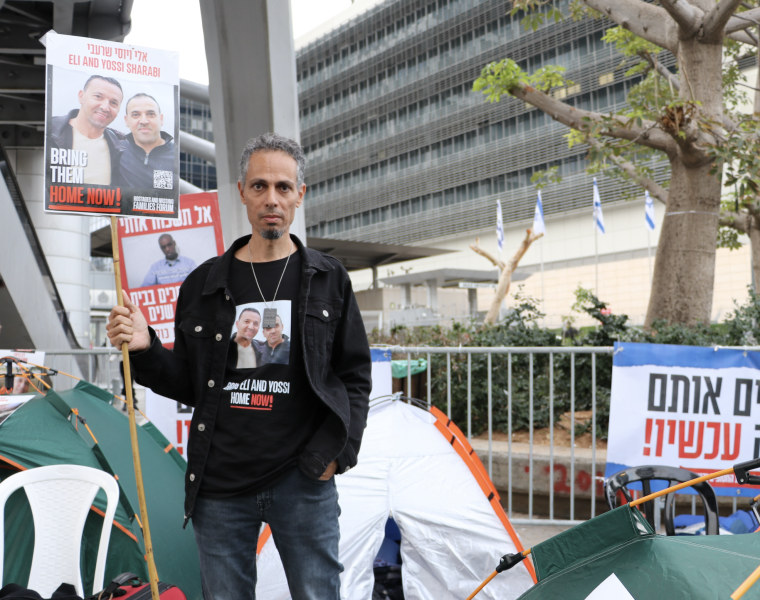
After learning that the IDF had mistakenly killed three Israeli hostages in its offensive in Gaza, Matalon said he wanted Israel to focus its efforts on securing a hostage deal to see those held captive released. The fighting in Gaza, he said, "is so dangerous for everyone, so we have to start the mechanism of releasing the hostages."
Matalon said camping outside the Israeli Defense Ministry felt like one way to make his voice heard. "Someone told me that you can do or you can feel. If you will not do, you will start feeling, so I think now I’d rather do and later, I will start dealing with the feelings," he said. "This is not the time now."
Communications gradually being restored after 3-day blackout
Telecommunication services in central and south Gaza are slowly being restored after the longest communications blackout in the Palestinian enclave since Oct. 7, according to provider Paltel.
"While overcoming challenging and hazardous conditions, our field teams were able to reach and repair the main damaged site after numerous attempts in the past days with the help of relevant international bodies," Paltel said in a statement on X today.
According to a translated version of another post, Paltel also told customers that they've been given free minutes and messages to Palestinian networks to stay in touch with their loved ones. Communications have been cut from Gaza for the past three days, which Paltel attributed to the ongoing aggression.
NetBlocks, an organization that monitors digital governance, noted in a post on X that while internet connectivity is slowly coming back online, service remains significantly below prewar levels.
Red Crescent resorting to walkie-talkies to reach injured amid Gaza's communications blackout
Successive and long-lasting blackouts have severely disrupted humanitarian work and the delivery of lifesaving assistance, aid organizations have said.
The Palestine Red Crescent Society said in video footage released on X that it was having to depend on aerial communications and walkie-talkies, making it harder to reach teams across the strip amid ongoing bombardments.
Weak signal connections and the potential for interference were affecting response times and the ability to coordinate ambulances and aid, the organization said. Power outages have affected the main aerial communication service, it added.
Previously, organizations such as Médicins san Frontières (Doctors without Borders) and the WHO have also said communications blackouts and disruptions significantly undermine health and rescue efforts and make the conditions more unsafe for health teams.
Israel government spokesperson says 'Oslo mistake' will not be repeated
The Israeli government’s Arabic spokesperson, Ofir Gendelman, said today that Gaza would be subject to Israeli control after “the elimination of Hamas” so that there is “no party or organization in Gaza that threatens us.”
Seeming to renege on previous statements from Israel’s government that it had no interest in governing Gaza, Gendelman said in a briefing, “As for the next day after the war, we will not allow Hamas to be replaced by Fatah.”
He added, “We will not repeat the Oslo mistake that brought in Palestinian terrorist organizations seeking to annihilate us,” referring to 1993 agreements between Israeli Prime Minister Yitzhak Rabin and Palestinian Liberation Organization leader Yasser Arafat that sought to establish a pathway for a two-state solution.
Gendelman also said Israel would “deter” Hezbollah in Lebanon through “diplomatic action or through action of another kind,” adding: “If calm does not prevail on the Israeli side of the border, calm will not prevail on the Lebanese side.”
Gaza under longest communications blackout yet
Gaza has entered its fourth day of a communications blackout, making it the longest halt in communications services since Oct. 7, according to NetBlocks, an organization that monitors digital governance.
Internet and telephone blackouts “significantly limit visibility into events on the ground,” NetBlocks noted on X.
It is the sixth near-total communications blackout of Gaza. Previous blackouts have either occurred as a result of the running out of fuel, or have preceded periods of particularly heavy fighting.
Israel controls telecommunication and internet services in Gaza, as well as electricity and fuel supplies.
505 Palestinians have been killed in the West Bank so far this year
Amid heightened tensions and spiraling settler and military violence, 505 Palestinians have been killed in the occupied West Bank so far this year, according to the Palestinian Ministry of Health. The deaths include 111 children.
More than half of the deaths, 297, have happened since Oct. 7.
This is the deadliest year in the West Bank since the U.N. began keeping records in 2005, and far outstrips the numbers in 2022, when 155 Palestinians were killed.
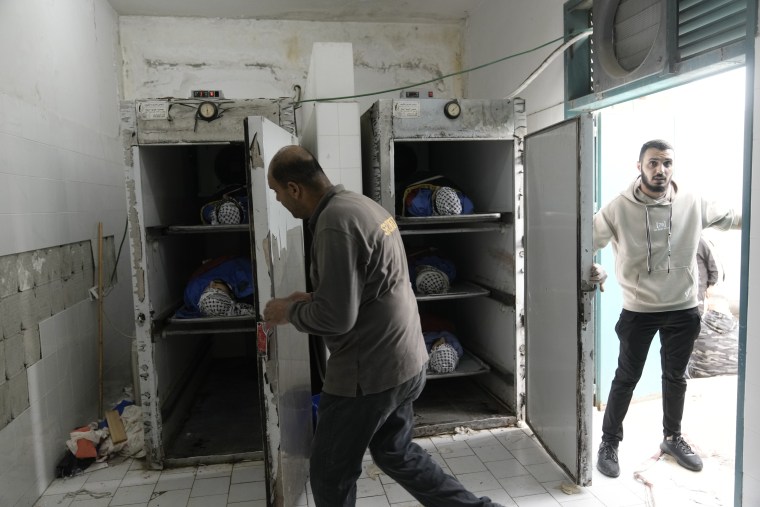
Al Shifa hospital is a 'bloodbath,' WHO says
Hundreds of injured patients are crowded into the emergency department of Al Shifa hospital, the World Health Organization said in a statement after visiting the hospital yesterday. The scene, WHO said, was a "bloodbath."
New patients were arriving "every minute." The injured were being sutured with little to no anesthesia. The floor of the department was so crowded with patients that staff are having to take care to avoid stepping on them.
Al Shifa was once Gaza's largest hospital, but weeks at the center of hostilities had left it deeply damaged and "minimally functional." Tens of thousands of people continue to shelter at the hospital and are in need of food and water.
Kerem Shalom crossing to Gaza opened
Israel's Kerem Shalom crossing at Gaza's border with Israel and Egypt opened today for truck inspection and the passage of humanitarian aid, IDF spokesperson Richard Hecht said in a media briefing.
It is the first time the crossing has opened since the beginning of Israel's war with Hamas on Oct. 7.
Hostage families continue to pressure Israel's war Cabinet
The families of those taken hostage by Hamas on Oct. 7 said in a message to Israel’s war Cabinet yesterday that they would “entrench” at the entrance to Kiriya base — Israel’s military center in Tel Aviv — until “an Israeli outline is received to release all the hostages.”
A rally in Tel Aviv’s “Hostage Square” last night drew a crowd of an estimated 100,000 people. Former hostages who were released during the cease-fire last month spoke at the rally.
Families said that they would remain at Kiriya “24/7” until a deal was reached.
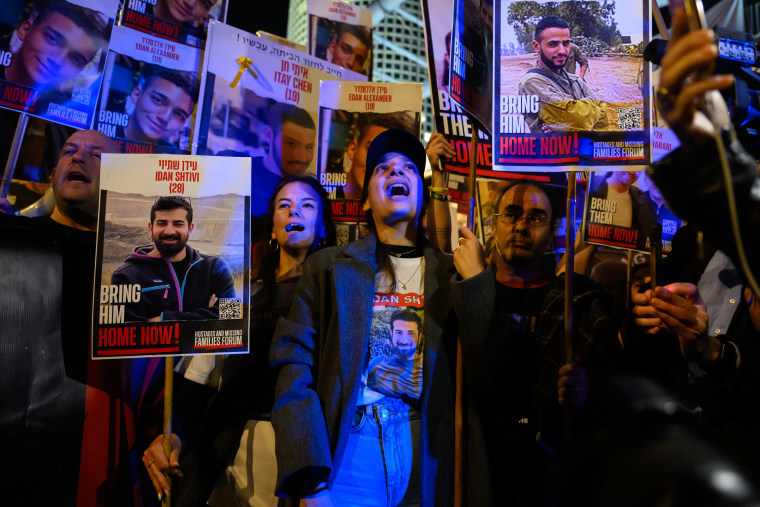
Israeli minister vows to back IDF soldier suspended for beating a photojournalist
Itamar Ben-Gvir, the national security minister, promised to back an IDF soldier suspended for assaulting a Turkish photojournalist in East Jerusalem on Friday.
Footage uploaded to X by CNN on Friday showed a group of IDF soldiers harassing Mustafa Haruf, a photojournalist for Anadolu, the Turkish state news agency. In the video, the soldier was seen shoving and punching Haruf, before hitting him on the head with a gun and threatening to shoot. They kicked him repeatedly as he lay on the ground.
Ben-Gvir said on X that he had spoken to a soldier involved in the assault, whom he described as an “outstanding officer” operating “under laboratory conditions,” echoing language frequently used by far-right politicians to justify military attacks on civilians and journalists.
Ambulance crews blocked by a tank from treating injured, Red Crescent says
One person died at Nur Shams refugee camp in Tulkarem, in the occupied West Bank, after an Israeli tank blocked a convoy of ambulances from entering the camp, according to a video posted by the Palestine Red Crescent Society on X this morning.
Responding to a request for comment from NBC News, the IDF did not address the blocking of ambulance crews, but said that Israel Border Police forces conducted “counterterrorism activity” at the camp overnight by ground and by air.
Hamas demands Israel cease ‘aggression’ before more hostage release deals
Hamas said it would not conduct more negotiations around hostage exchanges unless Israel stopped its offensive in Gaza.
The group issued the statement on Telegram, saying its stance has been conveyed to all mediators.
“Hamas reaffirms its stance not to conduct any negotiations to exchange prisoners” until Israel stops its assault on Palestinians, “once and for all,” the group said.
The statement comes after the mistaken killings of three Israeli hostages by the Israeli military prompted renewed calls in Israel for the release of the roughly 100 hostages still held by Hamas in Gaza.
TEL AVIV — Thousands of people rallied in Tel Aviv today to call for the release of the remaining hostages being held by Hamas militants.
Some of the rallygoers included family members of hostages, who demanded that the Israeli government do more to bring their loved ones home.
“The Israeli families believe that the Israeli government needs to put an offer on the table today and not wait for an offer to come from Hamas, from Qatar or even from the United States,” said Ruby Chen, the father of 19-year-old Itay Chen, who was taken hostage by Hamas. The Israeli government “needs to take the initiative and put an offer on the table.”
Hamas says Israel is ‘gambling with the lives of its soldiers’
Hamas released a statement following the death of three hostages mistakenly killed by the Israel Defense Forces, saying Israel is “gambling with the lives of its soldiers captured by the resistance.”
Hamas compared the killing to the “blatant criminal behavior” that Israel “continues to practice against its captives in Gaza.”
Brother of American Israeli held captive says hostage deal must be priority
TEL AVIV — Lee Siegel, 71, normally likes to keep to himself, but in the weeks since his brother was taken hostage by Hamas, he has become an activist, joining thousands of people tonight in calling on the Israeli government to do more to see those still held captive released.
Keith Siegel, 64, and his wife, Aviva Siegel, 62, were taken hostage from their home on the Kibbutz Kfar Aza together on Oct. 7. Aviva Siegel was released several weeks ago, but Keith Siegel, who is an American Israeli dual national, remains held captive.
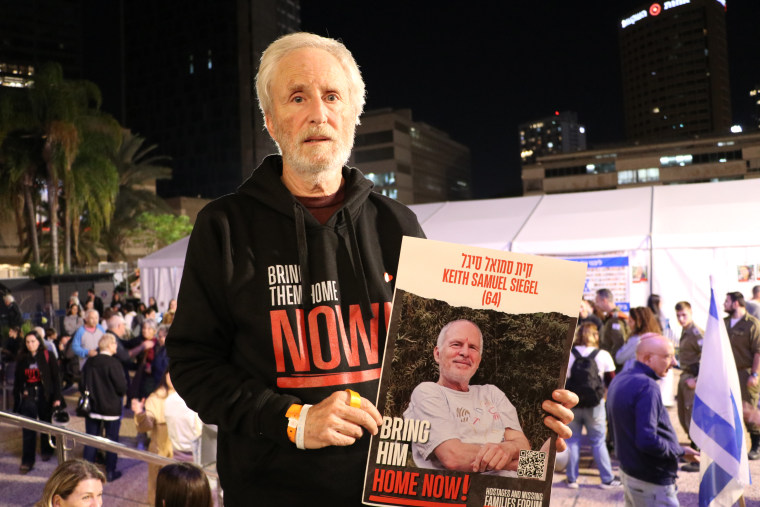
Siegel said his sister-in-law had described harrowing conditions during her time in captivity. Held both above and below ground, she said there were times when it was “very, very difficult to breathe” while underground. Food, mainly pitas and rice, and water were at times scarce, and she lost about 22 pounds, he said. She also described hostages being “physically intimidated and hurt,” but Siegel said she didn’t elaborate.
Siegel said he wanted the Israeli government to make negotiating a hostage deal a priority. He said he believes hostages, including his brother, will only be released “when there is not violence.”
Catch up with NBC News' latest coverage of the war
- IDF mistakenly killed 3 Israeli hostages in Gaza. This is what we know so far.
- Anger at Israeli government mounts after military admits to mistakenly killing hostages
- Is Netanyahu putting his own political future ahead of the good of Israel?
- An Israeli teen lost his father and brother in the Hamas attacks; an American boy was inspired to take action
- Her parents were told to seek safety in Rafah. A piece of shrapnel killed the 7-year-old in her sleep.
- U.S. urges Israel to move to a new phase of its war against Hamas






